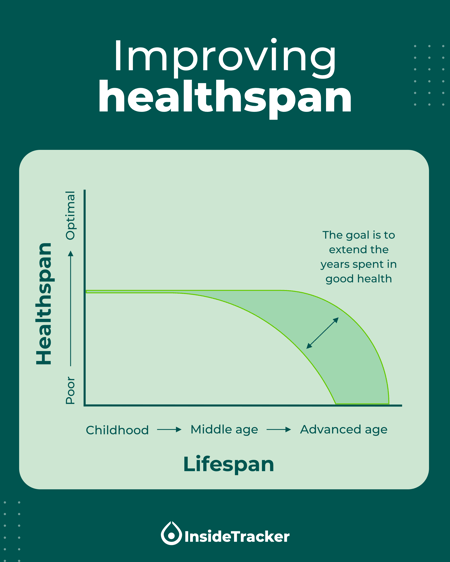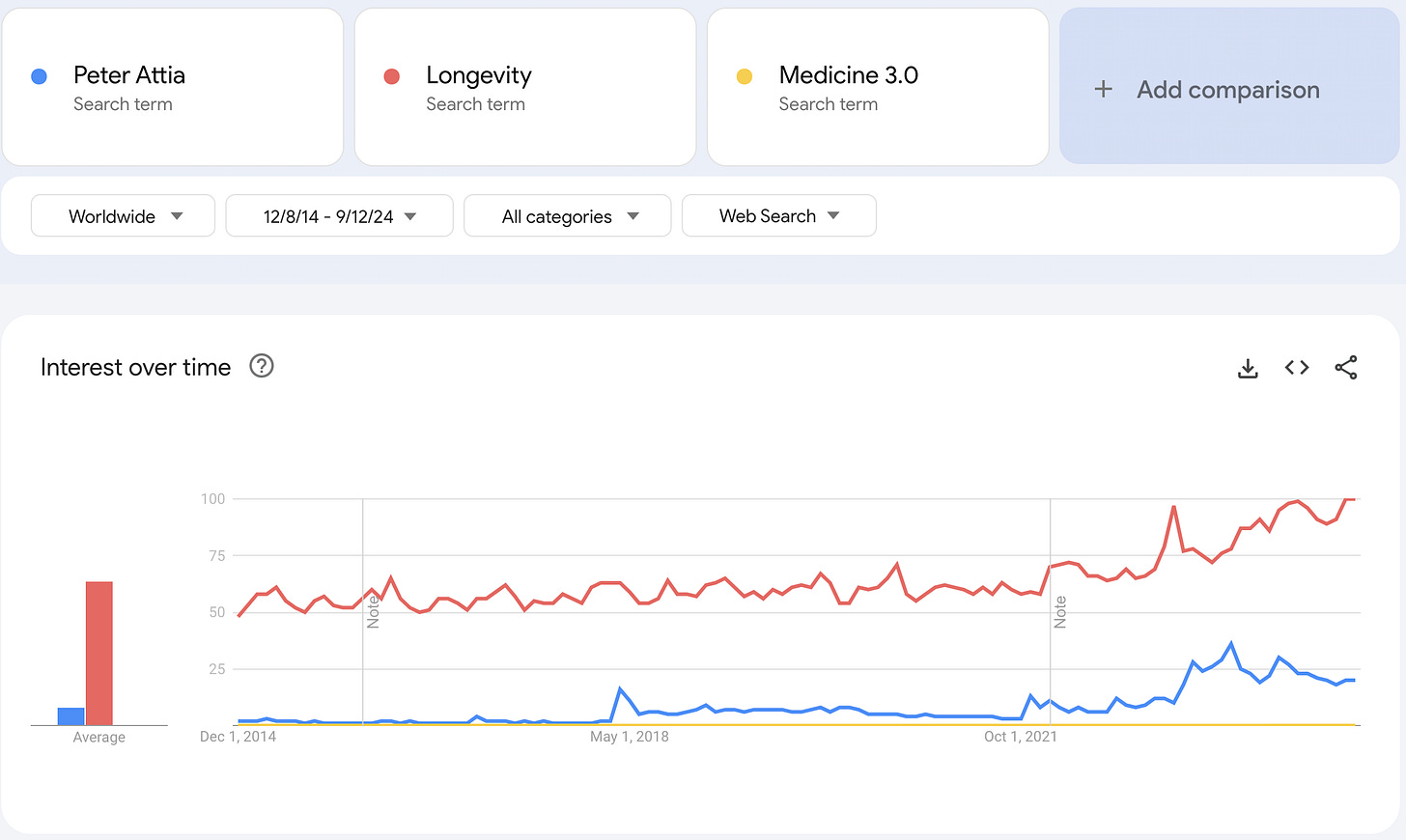Thoughts on the longevity and healthcare 3.0 trend
Millennials are around 40 years old! They are starting to feel the first signs of aging. This is driving a longevity trend, and is a massive boon for the supplement industry. My perspectives.
The below is a repost from one of my early roundups. Substack literally prompted me to repost older content if it’s still relevant, since new subscribers would not have seen it yet. I also have had a history of putting a short/mid-length original post underneath my roundups. Some of them might be able to stand on their own. This, I think, is one of them.
Millennials are around 40 years old! They are starting to feel the first signs of aging. I personally experienced my first overnight stay in a hospital in the beginning of 2023, to get my appendix removed. A few weeks after that, my fitness level, as measured by VO2Max, reached an all-time low of 37.5 and I had a scary episode of heart arrhythmia (benign thankfully). My most important reflection at the end of 2023 was: Don’t take your health for granted.
This fits in with a growing number of my peers. And we all read Outlive by Peter Attia. This book articulates the goal to increase healthspan, i.e. that period of life where you are in good health, able to do lots of things. When you’re 80 years old, you still want to be able to climb 2 flights of stairs unassisted, carrying a bag of groceries. Ideally, we would be healthy and strong until we suddenly drop dead at 120 years old, avoiding any real suffering and period of disease.

The core premise of the book is that if you want to maximize your chances of that happening, you have to take action NOW. It’s quite motivating!
The book also promotes an aggressive early testing regimen including regular colonoscopies from age 40 (not looking forward to that), and extremely aggressive intervention, with drugs if needed, to bring cholesterol levels down. It’s interesting that a lot of people are seemingly doing these tests for fun, or out of interest but without the intent to actually take action based on them. But that’s not the only interesting part.
An explosion of startups
Startups who help people run the Longevity or Medicine 3.0 playbook are booming. They can be bucketed along: preventing premature death, slowing the aging process, and reversing aging. The one I personally am most familiar with is Singapore based startup Mito Health. They provide access to testing, and an app to coach people to implement the test based actions. As much as I love Mito and admire their flawless execution, I would be surprised if it becomes a unicorn.
Increasing health span is strongly subject to the 80/20 rule
Peter Attia’s super deep and detailed content on the 20% notwithstanding, even he admits readily that just by exercising more and eating a bit better, people are 80% there in terms of improving their health span. With regard to diet, it boils down to Michael Pollan's timeless mandate: “Eat food, mostly plants, not too much.”
With regard to exercise, both endurance and strength is important. But incremental returns diminish very quickly. For a sedentary person who never exercises, just starting a habit of walking(!) every day for 30 minutes is already transformative for their health. “Exercise is by far the most potent longevity 'drug’” says Peter Attia. There is absolutely no point taking Metformin for someone who eats junkfood and never exercises.
The point is, there is no need for a personalized AI to tell you this. All you need is a way to implement a basic exercise regimen and make better food choices. Therefore, I believe the the app and AI assistant part of startups like Mito is pretty low value-add. The real value lies in making it much easier to do early testing. It seems to me that regular labs would catch-on and start offering these test packages sooner rather than later. There seems to me to be quite limited defensibility in either of the pillars (testing access and personalized advise).
What I’m saying is that the core premise: “personalized preventative strategies are key to extending health span” is somewhat shaky. My conclusion from the content is that it’s more like: “a common set of basic preventative strategies are key to extending health span”. And at the end of the day, the implementation of even those basic strategies is where it goes wrong for the vast majority of people.
Loosely held view on this and still love Mito and Peter Attia
Having said all that, I’m maybe only about 75% sure that I’m right on this. I have been convinced by Peter Attia that regular testing from the age of 40 or mid 30s, or whenever around that time is a good idea. The blood and microbiome tests I did last year were insightful and led to changes that I believe improved my wellbeing in the short term. They were: more exercise, correcting low Vitamin D level, and a set of diet interventions to repair my microbiome after the operation.
I also want to make sure that I give you, reader, the right takeaway wrt my personal view on Peter Attia and Outlive. I loved the book. Before reading it I thought Peter Attia was one of those health charlatans like Andrew Huberman. But the book very pleasantly surprised me on this front. Attia actually started to implement his views with real patients, and he was open minded and accountable enough to let the outcomes change his mind on a large number of things.
He used to believe the Keto Diet was good for everyone. He discovered that it’s only beneficial for a very small percentage of people and detrimental to the vast majority.
He used to believe that intermittent fasting had all kinds of protective long-term effects, a common believe based mostly on a very bad study in monkeys1. He changed his mind completely on this.
He is still extremely hardcore about cholesterol. But in his efforts to find truth he keeps track of good science without cherry picking and interprets it quite well.
The book is worth reading for many reasons, one of them being the best explanation I’ve ever read for why it is so damn hard to study whether anything is healthy or unhealthy.
So, to end this week’s newsletter:
Eat food, mostly plants, not too much
Exercise
It might be worth it to do some blood tests

